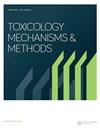An investigation of the mutagenic activity of salamide – a major impurity of hydrochlorothiazide
IF 2.7
4区 医学
Q2 TOXICOLOGY
引用次数: 2
Abstract
Abstract Hydrochlorothiazide is a widely used antihypertensive agent and one of its major impurities, salamide (4-amino-6-chlorobenzene-1,3-disulphonamide), has a chemical structure containing a primary amino group, a functional group that has previously been reported to be associated with carcinogenic activity. It is known that hydrochlorothiazide purity is a challenging problem for the pharmaceutical industry. As there were no prior mutagenicity data for the impurity salamide, the aim was to investigate its mutagenicity in this study. Salamide was tested for mutagenic potential in Salmonella typhimurium TA98, TA100, TA 1535, TA 1537, and E. coli WP2 uvrA + E. coli WP2 [pKM101] strains at six different concentrations, the highest concentration being the 5000 μg/plate. In both the presence and absence of the metabolic activation system, no mutagenic activity was observed. Results indicated that salamide should be classified as an ordinary impurity and controlled according to Q3A(R2) and Q3B(R2) guidelines.氢氯噻嗪类主要杂质salamide致突变活性的研究
氢氯噻嗪是一种广泛使用的降压药物,其主要杂质之一salamide(4-氨基-6-氯苯-1,3-二磺胺)的化学结构中含有一个初级氨基,该官能团先前已被报道与致癌活性有关。众所周知,氢氯噻嗪的纯度对制药业来说是一个具有挑战性的问题。由于之前没有关于杂质salamide的致突变性数据,因此本研究的目的是研究其致突变性。测定Salamide对鼠伤寒沙门氏菌TA98、TA100、ta1535、ta1537和大肠杆菌WP2 uvrA + E的致突变性。大肠杆菌WP2 [pKM101]菌株在6种不同浓度下,最高浓度为5000 μg/板。在代谢激活系统存在和不存在的情况下,均未观察到致突变活性。结果表明,salamide应归类为普通杂质,按Q3A(R2)和Q3B(R2)标准进行控制。
本文章由计算机程序翻译,如有差异,请以英文原文为准。
求助全文
约1分钟内获得全文
求助全文
来源期刊

Toxicology Mechanisms and Methods
TOXICOLOGY-
自引率
3.10%
发文量
66
期刊介绍:
Toxicology Mechanisms and Methods is a peer-reviewed journal whose aim is twofold. Firstly, the journal contains original research on subjects dealing with the mechanisms by which foreign chemicals cause toxic tissue injury. Chemical substances of interest include industrial compounds, environmental pollutants, hazardous wastes, drugs, pesticides, and chemical warfare agents. The scope of the journal spans from molecular and cellular mechanisms of action to the consideration of mechanistic evidence in establishing regulatory policy.
Secondly, the journal addresses aspects of the development, validation, and application of new and existing laboratory methods, techniques, and equipment. A variety of research methods are discussed, including:
In vivo studies with standard and alternative species
In vitro studies and alternative methodologies
Molecular, biochemical, and cellular techniques
Pharmacokinetics and pharmacodynamics
Mathematical modeling and computer programs
Forensic analyses
Risk assessment
Data collection and analysis.
 求助内容:
求助内容: 应助结果提醒方式:
应助结果提醒方式:


